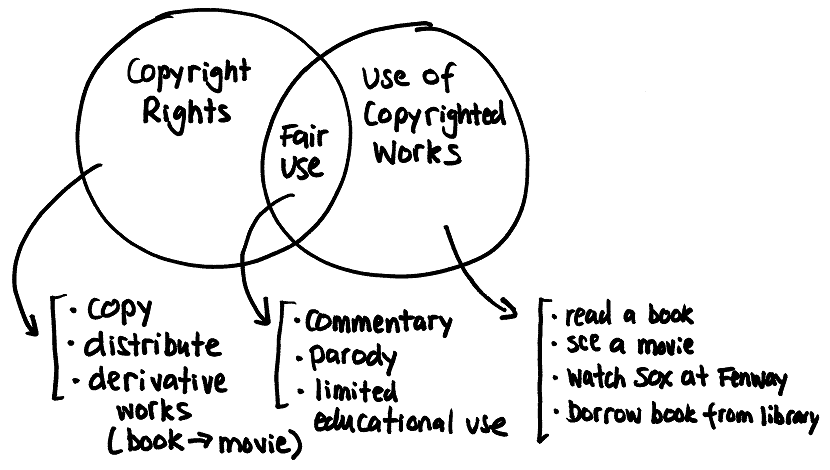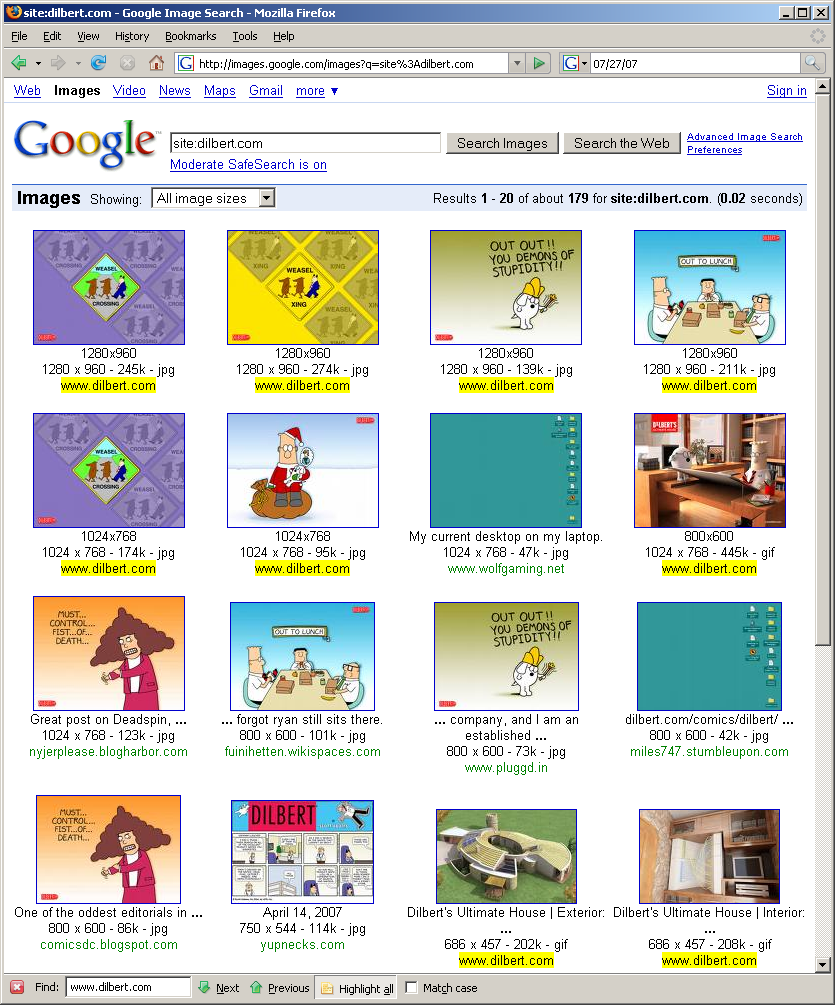Plus how to detect hotlinked images.

My blog is a work in progress. I have long-term and short-term projects. I recently completed a long overdue project. I wrote to United Media, the publisher of the Dilbert comic strip, to request permission to reprint a Dilbert comic that I blogged about a couple of years ago. (See Musician Loses Job Due To File Sharing.) United Media recently granted my reprint request for $30.
Scott Adams, Dilbert’s creator, has maintained that there is widespread copying of the Dilbert comic strip on the Internet and that much of the unauthorized copying can be characterized as stealing. (I don’t believe he disputed that unauthorized copying has beneficial side-effects. For the record, I’ve been saying that ease-of-copying is the Interent’s biggest asset for over a decade. But that’s not really my point. Or his.) He is correct, of course.
Referring back to my BoingBoinged copyright-on-a-napkin, copyright-on-the-back-of-an-envelope, copyright-for-kids drawing, you can see that Scott Adams is referring to the rights that are on the left part of the drawing.

So you do not need permission from Scott Adams to read the latest Dilbert comic strip (an unregulated use – right part of the drawing), and you would not need his permission to write a critique of “The Dilbert Principle” that included excerpts of that book (fair use – center part of the drawing), but you would need his permission to create a movie from the Dilbert comic strip (derivative work – left part of the drawing).
And then there is copyjacking, which I’ve defined as bad hotlinking, namely inline linking of content (usually images) (1) that is not authorized by the website that is hosting the content and (2) where the displaying website displays the images as if they were native to the displaying website.
This definition distinguishes copyjacking (“bad hotlinking”) from “good hotlinking” which is (1) authorized by the hosting website and (2) displayed as such. Examples of “good hotlinking” include Amazon product links (which use inline frames) and YouTube videos (embedded), and Google Image Search (thumnail images in one frame, third party content in another frame (and identified as such)). In all of these examples, the “good hotlinking” content includes links back to the hosting website:
- “The Dilbert Principal” by Scott Adams (text link here
, since iframes do not render in Google Reader)
“The Dilbert Principle: A Cubicle’s-Eye View of Bosses, Meetings, Management Fads & Other Workplace Afflictions” by Scott Adams.
- Microsoft Surface Parody Video
Here is a Google search for images hosted on dilbert.com:

I’ve highlighted the web pages that are hosted on dilbert.com. The others (the ones that are not highlighted) are hotlinking images from the Dilbert website. Some of these are likely copyjackers. (If there is a method for finding only hotlinked images, then I admit to not knowing the method.)
I paid $30 for the right to reprint one Dilbert comic on my blog. It’s more than I pay for stock photography, but a Dilbert comic strip is more valuable to me than a stock photo.
As an aside, reading the reprint agreement made me giggle, because United Media refers to itself as “UM” in the agreement, which makes for some funny sounding clauses like this one:
“Customer shall immediately provide UM, free of charge, two copies of any printed piece or publication Customer creates using the Material.”
My main points are that copyright infringement is, UM, bad, copyjacking is, UM, bad, and paying for legal reprints is, UM, good. Now if you’ll excuse me, I have to fax two copies of my 2004 blog page to UM.
As Scott Adams would say, “Comments are open. Go.”



* Dilbert Comic Strip Dropped By US Media Over Creator’s Racist Tirade (2023-02-26)
https://www.bbc.com/news/world-us-canada-64775250
Like Bill I was seeking an estimate to include one Dilbert comic – the 3 frame version. I clicked on the “Buy” button at the bottom right and was presented with a form to fill out to receive a cost quote. Also as Bill noted, there is a $10 up-front processing fee. Like Bill – I don’t care to pay that. What’s more – how am I supposed to know how many books will be distributed – I haven’t even written it yet… I would just like a ballpark estimate before I craft dialogue around the Dilbert satirizing all the buzzwords we use. So, it’s time to abandon the thought of memorializing a pretty funny Dilbert comic.
I was looking to incorporate a Dilbert comic strip about the Indian intern Asok in my Digital story-telling blog!
Glad to come across your post!! UM was like Phew! 🙂
Since comments are open, I’ll add that the syndicate charges a $10 fee to find out how much it costs to reprint a Dilbert strip in a book, which is ridiculous. Their rival syndicate (I asked to reprint a Get Fuzzy strip in a book), simply gave me a reasonable quote, which I was happy to pay. But I don’t think I’ll fork over a sawbuck to ask for a price quote.
Hi, I was searching for a copyright matters.
I want to use some of Dilbert’s comic on my company website but i don’t have a big budget (just a new start company). Do you know how i can be able to use it for free..The comic strip is just for decoration purpose only
From my archives: Legal Dilbert Reprints… http://is.gd/eIL5